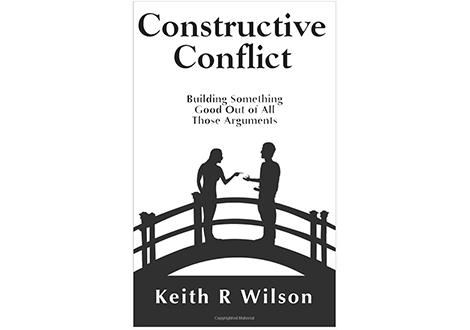Blog
Book Review - Constructive Conflict: Building something good out of all those arguments, by Keith Wilson
Posted by Amy Rosechandler

Part of my responsibility as a therapist is to stay up-to-date about therapy techniques, community needs, and approaches that might help my clients. I am often asked to review books and materials my colleagues write.
I chose to review the book by Keith Wilson, Constructive conflict: Building something good out of all those arguments. This book is great for therapists to use with their clients, and for anyone looking for clear strategies about how to improve communication during conflict.
Deciding about whether to broach conflict in any relationship can feel like a risk. Conflict is fear inducing for many of us. We’re not sure we can trust ourselves to say what we feel and to get our message across. We rehearse conflicts in our mind, imagining getting hurt or inflicting hurt. And despite the risk, we may not get what we need or want from conflict. A friend recently brooded for hours before asking her aunt to follow-through more on plans they made. The next time they scheduled a dinner; her aunt apologized profusely, but still cancelled. My friend felt like she went through a lot of emotional work without pay-off.
Constructive Conflict: Building Something Good out of All Those Arguments is a new book by Keith Wilson, a therapist and author in Rochester, New York. The book focuses on helping couples improve communication and learn from one another. I found the concepts presented apply to most relationships. Keith makes a good point straight away in the first chapter. “Love is the means by which we have evolved compassion, generosity, and empathy”. Love helps motivate us to work through conflict. Whether we are facing conflict with an aunt, a co-worker or we're in a road-rage situation, love is what turns the mind toward understanding.
Relationship conflict is one of the most common stressors people bring into therapy. Although the stress may be the result of conflict between people, often an individual seeks support and personal strategies to cope with the conflict. One partner often holds the onus for resolving individual concerns before the couple will work together or even admit the problem is between them as a couple. Even if the issues are something that can be addressed individually in therapy, inviting a partner or family member into therapy can help determine new ways of communicating effectively. There is also space to start practicing what works and have a space to be honest and heard.
Couples often ask for tools and strategies to improve communication, which is why I was so happy to come across this book. Keith Wilson has worked with couples for many years, and outlines the wisdom he has gained from this work in his book. This practical, down-to-earth book outlines 14 clear strategies to practice and improve the effectiveness of conflict communication. The ideas are intuitive. The importance of being genuine and softening up, for example, relate to a ‘deep down’ sense of what to do in a conflict. Keith describes these keys to communication in one place, and would make a good companion to therapy work. As you reader, you'll feel understood as the author explains how and why couple's sometimes get stuck in conflict or avoid it all together. Best of all, the book's tone and style make it fun to read and put into practice with your loved one. A focus of the book seems to be that we all have needs in relationships and that in conflict, we are simply trying to get our needs taken care of. Learning more tools for constructive conflict can produce long term changes for couples to work together and take care of one another.
Find on Amazon: Constructive Conflict: Building Something Good Out of All Those Arguments
by Keith R Wilson